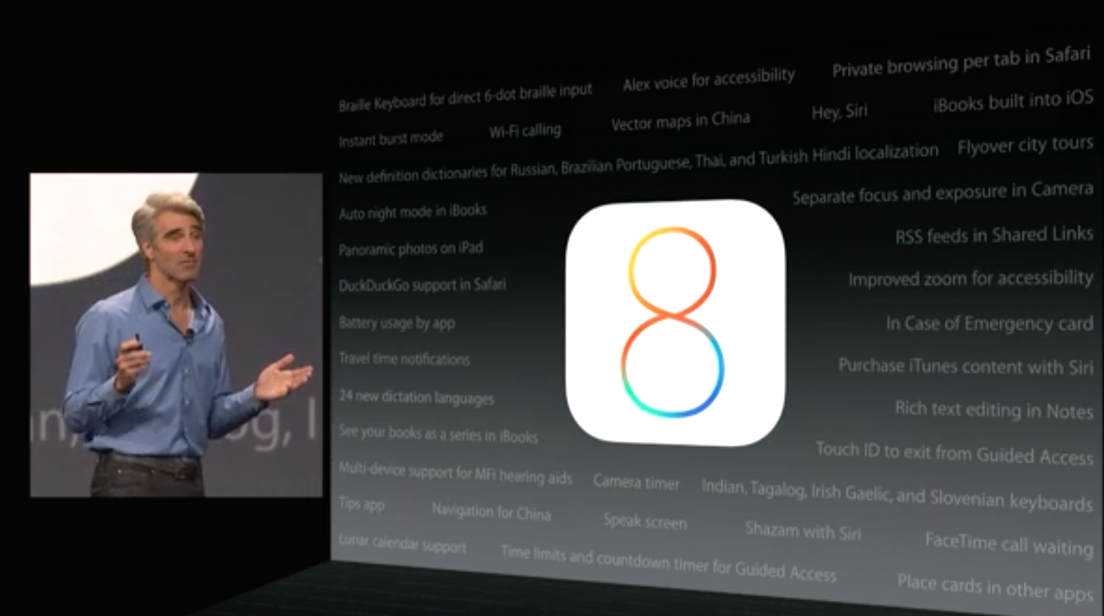Cassandra: Apple's WWDC - The Dust is Still Settling

AMITIAE - Monday 4 June 2014
|
Cassandra: Apple's WWDC - The Dust is Still Settling |
 |
|
|
By Graham K. Rogers
Later on Tuesday (3 Jun) there was also the arrival of some software from Apple that I signed a non-disclosure agreement to use. I have been running that for the last few days, keeping to the NDA while several sources have been putting out information in defiance of the agreements. I am allowed to use things that have been already disclosed, so they open the door for me a little. Nonetheless, there are a number who comment without breaking the NDA. One of these is the respected, Rene Ritchie of iMore who calls WWDC 2014, "A love letter from Apple". The article discusses the internal organisation at Apple that has seen the emergence of Craig Federighi as "Superman" (Tim Cook's term). As he writes, WWDC had none of what had been expected, other than the twin focus on OS X and iOS 8, aimed at developers. The article also mentions other highlights, such as Swift - the fact that this was a total surprise and had been in development for 4 years, shows that Apple really does have the upper hand in control of the message. In the beta of XCode 6, Jerry Hildenbrand of iMore reports that there are references to a selection of iPhone screen sizes, including Resizable iPhone and Resizable iPad.
Further to this, Michael Steeber (also on 9to5Mac) has a video of the new Notification Center. He also looks at the new Spotlight. Another close look (on 9to5Mac too) focuses on the OS 8 Health App. This has created much interest, especially as for the last year or so some have been basing their reputations on an iWatch. This is confirmed and Dom Esposito has a run down of the way this app will work. There is also a video. It may be too early to comment on its usefulness outside of the US (and Europe) although it looks as if some parts may not need third party app access. As well as Healthkit, Apple announced its standard for HomeKit. The hope is that a standard will be used rather than the randomness that exists now for home appliances linked to devices. Chuong H Nguyen on iMore tells us that it "creates a unified interface where you can control all aspects of your home." He adds that "HomeKit works on a common network protocol to ensure smooth interoperability." A new version of the iCloud service is to be added called iCloud Drive, perhaps as a reaction to the success of Dropbox and the recent changes to Microsoft's OneDrive. Adario Strange on Mashable reports on the pricing and makes comparisons with other current cloud services.
Locally, I see on that slide that there is to be new definition dictionaries for Russian, Brazilian Portuguese, Thai and Turkish Hindi localization. There are also to be 24 new dictation languages as well as Indian, Tagalog, Irish Gaelic and Slovenian keyboards.

What was mentioned in the presentation was that third-party keyboards would be available for installing on iOS 8. This had a lot of applause but there is not yet much information about this. There was a little (including a couple of keyboard names) in an item by Matt Brian on Engadget and by Josh Lowensohn on The Verge
Extensions will also be available for OS X 10.10, Yosemite, and a new System Preference panel is expected to be used for this. Cunningham's article is well-worth taking time over. Another article with an almost-identical approach comes from Federico Viticci on MacStories.
I must admit I have discovered that some iBeacons are being used in Bangkok malls by way of iBeacon developer apps I have installed on my iPhone. Which stores use them, I have no idea (or even if someone has the iPhone set as an iBeacon), so the idea of being advised that there is an app available for the iBeacon you have just stepped in, is a great idea. Having tried to find iBeacons, or the apps that might use them, the idea of letting them give up, is most appealing and has obvious benefits in terms of service-user interaction.
Another revelation came when the code in OS X 10.10, Yosemite, was examined. Like in a briefly-available seed of 10.9.4 that is under development, there is code that refers to an upcoming iMac with Retina display. Jordan Kahn on 9th5Mac reports on this and links to the French site, Macbidouille whose Lionel tells us, "La structure de ce tableau est identique à celle des MacBookPro Retina (et différente de celles des écrans non Retina)". Exactly. Have a look at Jordan Kahn's version, but the translation of the French title is "There will be a Retina iMac very soon" (I studied French at high school). It is useful to know which devices can run the new operating systems (apart from a Retina display iMac). A number of sites, including TUAW (John-Michael Bond), list what is known so far. Put simply, if the computer can run Mavericks, it can run Yosemite. For iOS 8, the losers here are those with the iPhone 4. Anything after that (4S) will be able to install iOS 8, and any iPad that runs iOS 7 should be OK. There is no information about any restrictions or limited features with the older devices. Bond did have a revealing comment, however: "It's remarkable that it took four years for the iPhone 4 finally be phased out of iOS updates. Show me an Android phone with that life span."

I am always disturbed by those who post screen shots from the pre-release software on Facebook or other sources. This has usually come from a friend of a friend and people think it is cool to have an early version. They usually go in my "Idiot" file. Particularly with iOS versions, if something does go wrong, there may be no going back. Some suggestions on this come from the normally responsible iDownload Blog. Joe Rossignol explains how users running the iOS 8 beta may go back to iOS 7. I think there is a certain irresponsibility here: encouraging non-developers to try out such software.
My point here is that if the testing is to be done under real operating conditions, I need to be working as I normally do and accept the risks. Data of course, is backed up on several disks, with some on iCloud and Dropbox as well.
Even if they had started right away, it would be at least 6 months before any other company would be able to sell a 64-bit chip. Note also that one exec lost his job when he said it was not important: his company thought otherwise. We also had the fingerprint sensor that stored the data (not the fingerprint) in a secure enclave on the A7 chip. It was clear from some comments that many were unable tio understand the difference between the fingerprint and the data interpretation. That set off a major security panic, and brought out the grand-standing Al Franken again, until he and the rest of the industry realised this was a non-issue. It was data only, it was secure; and it could not be accessed by Apple. iOS 8 of course now brings a new set of fears for those whose business it is to sell clicks. Commenting on PC Advisor (that should be a warning on its own), Antone Gonsalves expresses the fear that Apple's new Handoff technology (which allows a user to pick up on the Mac what was being worked on, on an iOS device, and vice versa) may allow data leakage. This without any information on how the feature works. Clearly not really understanding how this is going to operate (with its secure personal hotspot networking) and the use of variable MAC addresses (see above), I have the impression that he and the security experts that he cites are good examples of the Roosevelt doctrine about nothing to fear but fear itself. That and the need to garner plenty of hits (did I put Apple in the title?). Tim Cook had a central part of the keynote presentation in which he emphasised the value that Apple places on the enterprise. It is hardly going to risk this with flaky security in a key feature. To further emphasise this relationship with Enterprise, Apple now has a web page dedicated to business in the Preview of iOS 8.
Darklight Advanced Image Editor is a nicely designed and uncomplicated app for photography that is free. I should look at some of those winning apps too.
He seemed unhappy that using Apple devices only might be a better solution ("people on Planet Apple have no reason to leave" is that a bad thing?) and ended with the derisory, "If Apple doesn't wow the world with new hardware, consumers may drift away from Planet Apple, after all" as if he was unaware that there is much to come. Perhaps the strain of setting up Re/Code means he is now hunting for hits like the rest of us.
Graham K. Rogers teaches at the Faculty of Engineering, Mahidol University in Thailand where he is also Assistant Dean. He wrote in the Bangkok Post, Database supplement on IT subjects. For the last seven years of Database he wrote a column on Apple and Macs. He is now continuing that in the Bangkok Post supplement, Life. |
|

For further information, e-mail to

|

|